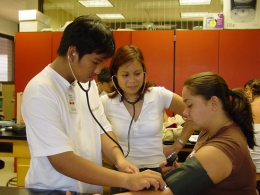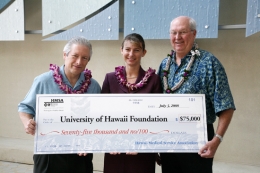Grants to Focus on Attracting Students to Health Care Field on Neighbor Islands
(Honolulu, Hawaiʻi) — The Hawaiʻi Medical Service Association (HMSA) today announced two $75,000 grants to help expand the number of health care workers on the Neighbor Islands. The funds will support the Hawaiʻi/Pacific Basin Area Health Education Center (AHEC) program, and will be distributed over the next two years.
The AHEC program began in 1995, and works to improve the distribution, quality and diversity of health care workers around the state. At the present time, there are community-based AHEC centers in Hilo, Lihue and Molokaʻi. The program is funded by a grant from the U.S. Department of Health and Human Services’ Health Resources and Services Administration to the University of Hawaiʻi John A. Burns School of Medicine (JABSOM).
"The Hawaiʻi State AHEC program is thankful to HMSA for its support," said Dr. Kelley Withy, associate professor and director of the AHEC center at JABSOM. "To meet Hawaiʻi’s future health care workforce needs, we believe it’s essential to be developing tomorrow’s workers today. We call it ‘growing our own healers.’ With HMSA’s support, we’ll be able to expand the program and reach more students and communities around the state."
The HMSA grants will support the AHEC program by:
- Expanding and developing new health career internships.
- Expanding Medical Academy of Science & Health (MASH) camps for students.
- Expanding Health Occupation for Teens (HOT) club activities on Kauaʻi.
- Expanding Huli Au Ola’s summer youth leadership activities to include rural students from Hawaiʻi and Kauaʻi.
- Creating a statewide conference for rural high school students, called Navigating the Future of Health Professions.
- Developing a web site resource with information on internships, research opportunities, training, and health center activities in the state.
"With AHEC and HMSA working together, Hawaiʻi’s rural students will be able to enter the health care career pipeline in middle school; get assistance navigating the journey through high school; participate in health care training and experiences, including internships; be mentored through higher education; and ultimately reach the destination of becoming health professionals in their home communities," said Dr. Withy.
"One of the best ways to interest young people in science is to allow them the opportunity for hands-on exploration," said Dr. Jerris Hedges, Dean of the John A. Burns School of Medicine. "By hearing a human heartbeat or measuring blood pressure in the body, or learning how high-tech medical equipment works, students realize careers in medicine are accessible to them. By instilling that sense of wonder in young people, these programs make it more likely the medical school will have high-quality, enthusiastic young college graduates to recruit in the future."
"We’re happy to help the AHEC program in its efforts to expand the health care workforce in Hawaiʻi’s rural areas," said Cliff Cisco, HMSA senior vice president. "Our support of the program is a great example of the community coming together to develop long-term solutions to help improve Hawaiʻi’s health care system."
"Growing our own health care workers is just as important as recruiting workers from other areas of the country, and HMSA is proud to support these important efforts," said Cisco. "AHEC does a good job of building student interest in health care careers, and providing a pathway for young people to enter the profession and work in their own community. Hawaiʻi’s rural areas will certainly benefit from this program in the years ahead."


# # #
The Hawaiʻi/Pacific Basin Area Health Education Center (AHEC) is a program within the John A. Burns School of Medicine at University of Hawaiʻi Mānoa that is supported by a grant from the US Department of Health and Human Services, Health Resources and Services Administration. For more information on AHEC, please visit their web site at www.ahec.hawaii.edu.
HMSA is a nonprofit, mutual benefit association founded in Hawaiʻi in 1938. It is governed by a community board of directors that includes representatives from health care, business, labor, government, education, clergy, and the community at large. HMSA is a member of the Blue Cross and Blue Shield Association, an association of independent Blue Cross and Blue Shield plans. Nationally, HMSA and 38 other Blue Cross and Blue Shield plans provide worldwide coverage to more than 100 million members. For more information, please visit hmsa.com.
The John A. Burns School of Medicine, UH Mānoa was established in 1967 as a twoyear program, and became a four-year degree-granting school in 1973. It is Hawaiʻi’s only medical school and has trained more than 1,800 medical doctors — more than half of the active physicians in the state. For more information about JABSOM please visit http://jabsom.hawaii.edu.
The University of Hawaiʻi Foundation is an independent, university-related, nonprofit organization whose purpose is to raise private funds according to priorities determined by the academic leadership of the University of Hawaiʻi and approved by the Board of Regents. Founded in 1955, the Foundation provides a full range of fund raising and alumni relations services for all 10 UH campuses. For more information, visit www.uhf.hawaii.edu.